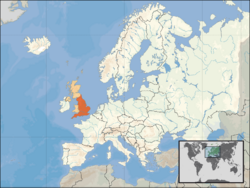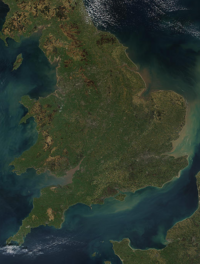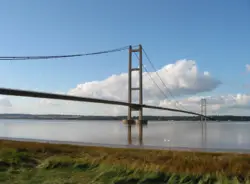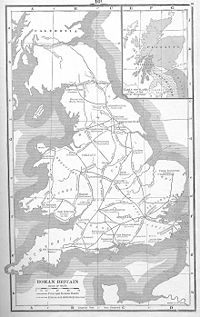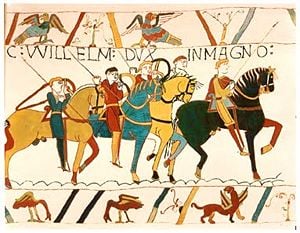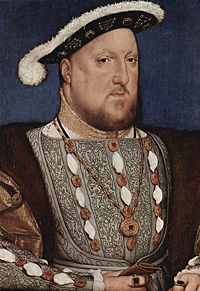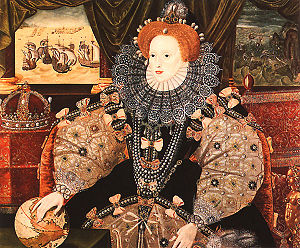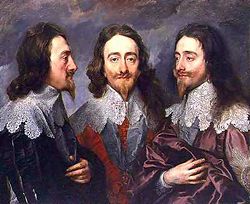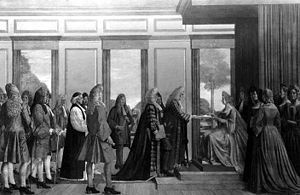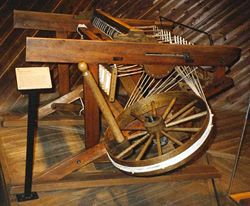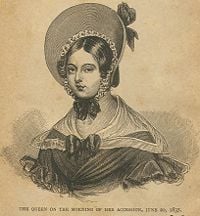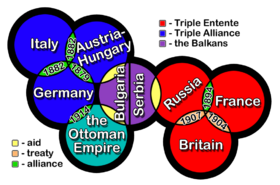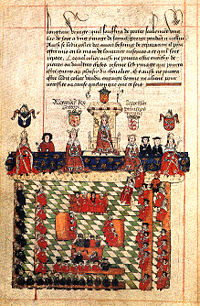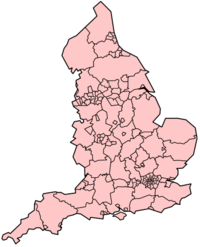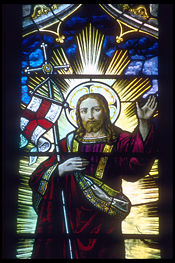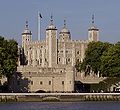Difference between revisions of "England" - New World Encyclopedia
Mike Butler (talk | contribs) |
Mike Butler (talk | contribs) (England - hist edit) |
||
| Line 209: | Line 209: | ||
===Enlightenment Britain=== | ===Enlightenment Britain=== | ||
| − | Britain was an important part of the [[Age of Enlightenment]] with [[philosophical]] and [[scientific]] input and a [[literary]] and [[theatrical]] tradition. Over the next century | + | Britain was an important part of the [[Age of Enlightenment]] with [[philosophical]] and [[scientific]] input and a [[literary]] and [[theatrical]] tradition. Over the next century England played an important role in developing [[Western world|Western]] ideas of [[parliamentary democracy]], partly via the emergence of a multi-party system, as evidenced in the rise of the [[Whig]] and [[Tory]] political parties. There were significant contributions to [[literature]], the [[arts]] and [[science]]. But, like other [[Great Powers]], England was involved in colonial exploitation, including the infamous Atlantic [[slave trade]], until the passing of the 1807 [[Slave Trade Act 1807|Slave Trade Act]] made the UK the first nation to permanently prohibit trade in slaves. |
Confidence in the rule of law, which followed establishment of the prototype of constitutional monarchy in Britain in the [[Glorious Revolution]] of 1688, and the emergence of a stable financial market there based on the management of the [[national debt]] by the [[Bank of England]], contributed to the capacity for, and interest in, private financial investment in industrial ventures. In addition, Britain had an entrepreneurial class which believed in progress, technology and hard work. This [[Protestant work ethic]] has been regarded as one of the cornerstones of national prosperity. | Confidence in the rule of law, which followed establishment of the prototype of constitutional monarchy in Britain in the [[Glorious Revolution]] of 1688, and the emergence of a stable financial market there based on the management of the [[national debt]] by the [[Bank of England]], contributed to the capacity for, and interest in, private financial investment in industrial ventures. In addition, Britain had an entrepreneurial class which believed in progress, technology and hard work. This [[Protestant work ethic]] has been regarded as one of the cornerstones of national prosperity. | ||
| Line 218: | Line 218: | ||
===The Industrial Revolution=== | ===The Industrial Revolution=== | ||
[[Image:Spinning jenny.jpg|250px|thumb|Model of the spinning jenny in a museum in Wuppertal, Germany. The spinning jenny was one of the innovations that started the revolution]] | [[Image:Spinning jenny.jpg|250px|thumb|Model of the spinning jenny in a museum in Wuppertal, Germany. The spinning jenny was one of the innovations that started the revolution]] | ||
| − | + | England led the [[Industrial Revolution]], a period in the late eighteenth and early nineteenth centuries when technological advances and mechanization transformed a largely agrarian society throughout Europe, causing considerable social upheaval. Much of the agricultural workforce was uprooted from the countryside and moved into large urban centers of production, as the steam-based production factories could undercut traditional [[cottage industries]]. The consequent overcrowding into areas with little supporting infrastructure saw dramatic increases in the rise of infant mortality (to the extent that many Sunday schools for pre-working age children (five or six) had funeral clubs to pay for each other's funeral arrangements), crime, and social deprivation. Many workers saw their livelihoods threatened by the process, and some frequently sabotaged or attempted to sabotage factories. These saboteurs were known as [[Luddite]]s. | |
===Chartism=== | ===Chartism=== | ||
| − | During the early [[nineteenth century]], the working classes began to find a voice. Concentrations of industry led to the formation of guilds and unions, which, although at first suppressed, eventually became powerful enough to resist government policy. [[Chartism]] is thought to have originated from the passing of the 1832 [[Reform Bill]], which gave the vote to the majority of the (male) middle classes, but not to the "working class." Many people made speeches on the "betrayal" of the working class and the "sacrificing" of their "interests" by the "misconduct" of the government. In 1838, six members of Parliament and six | + | During the early [[nineteenth century]], the working classes began to find a voice. Concentrations of industry led to the formation of guilds and unions, which, although at first suppressed, eventually became powerful enough to resist government policy. [[Chartism]] is thought to have originated from the passing of the 1832 [[Reform Bill]], which gave the vote to the majority of the (male) middle classes, but not to the "working class." Many people made speeches on the "betrayal" of the working class and the "sacrificing" of their "interests" by the "misconduct" of the government. In 1838, six members of Parliament and six working men formed a committee, which then published the People's Charter. |
| − | But by the end of the [[Victorian era]] (1900), | + | But by the end of the [[Victorian era]] (1900), England lost its industrial leadership, particularly to the [[United States]], which surpassed England in industrial production and trade in the 1890s, as well as to the [[German Empire]]. |
===Victorian England=== | ===Victorian England=== | ||
[[Image:Victoria1837Engraving.jpg|left|200px|thumbnail|Queen Victoria (shown here on the morning of her accession to the Throne, June 20, 1837) gave her name to the historic era]] | [[Image:Victoria1837Engraving.jpg|left|200px|thumbnail|Queen Victoria (shown here on the morning of her accession to the Throne, June 20, 1837) gave her name to the historic era]] | ||
| − | + | England's Victorian era marked the height of the British [[Industrial Revolution]] and the apex of the [[British Empire]]. Although commonly used to refer to the period of [[Queen Victoria's]] rule between 1837 and 1901, scholars debate whether the Victorian period—as defined by a variety of sensibilities and political concerns that have come to be associated with the Victorians—actually begins with the passage of the [[Reform Act 1832]]. The era was preceded by the [[English Regency|Regency era]] and succeeded by the [[Edwardian period]] | |
| − | By virtue of Queen [[ | + | By virtue of Queen [[Victoria]]'s marriage to [[Albert of Saxe-Coburg and Gotha|Prince Albert]], son of [[Ernst I, Duke of Saxe-Coburg and Gotha|Duke Ernst I]] of the small German duchy of [[Saxe-Coburg and Gotha]], her descendants were members of the ducal family of Saxe-Coburg and Gotha with the house name of [[House of Wettin|Wettin]]. Victoria's son [[Edward VII of the United Kingdom|Edward VII]] and his son [[George V of the United Kingdom|George V]] reigned as members of this house. |
===World War I=== | ===World War I=== | ||
| − | The First World War was a global military conflict which took place primarily in Europe between 1914 and 1918. More than nine million soldiers and civilians died. The conflict had a decisive impact on the history of the twentieth century. The [[Allies of World War I|Entente Powers]], led by [[France]], [[Russian Empire|Russia]], the United Kingdom and later [[Kingdom of Italy (1861–1946)|Italy]] (from 1915) and the [[United States]] (from 1917), defeated the [[Central Powers]], led by the [[Austria-Hungary|Austro-Hungarian]], [[German Empire|German]], and [[Ottoman Empire|Ottoman]] Empires. Russia withdrew from the war after the [[Communist revolution|revolution]] in 1917. | + | The [[First World War]] was a global military conflict which took place primarily in Europe between 1914 and 1918. More than nine million soldiers and civilians died. The conflict had a decisive impact on the history of the twentieth century. The [[Allies of World War I|Entente Powers]], led by [[France]], [[Russian Empire|Russia]], the United Kingdom and later [[Kingdom of Italy (1861–1946)|Italy]] (from 1915) and the [[United States]] (from 1917), defeated the [[Central Powers]], led by the [[Austria-Hungary|Austro-Hungarian]], [[German Empire|German]], and [[Ottoman Empire|Ottoman]] Empires. Russia withdrew from the war after the [[Communist revolution|revolution]] in 1917. |
[[Image:WWIchartX.png|thumb|right|280px|A graphic depiction of the state of international relations in pre-WWI Europe.]] | [[Image:WWIchartX.png|thumb|right|280px|A graphic depiction of the state of international relations in pre-WWI Europe.]] | ||
High anti-German feeling among the people during [[World War I]] prompted the Royal Family to abandon all titles held under the German crown and to change German-sounding titles and house names for English-sounding versions. On July 17, 1917, a royal proclamation by George V provided that all [[agnatic]] descendants of Queen Victoria would be members of the House of Windsor with the personal surname of Windsor. The name Windsor has a long association with English royalty through the town of Windsor and [[Windsor Castle]]. | High anti-German feeling among the people during [[World War I]] prompted the Royal Family to abandon all titles held under the German crown and to change German-sounding titles and house names for English-sounding versions. On July 17, 1917, a royal proclamation by George V provided that all [[agnatic]] descendants of Queen Victoria would be members of the House of Windsor with the personal surname of Windsor. The name Windsor has a long association with English royalty through the town of Windsor and [[Windsor Castle]]. | ||
| − | After the carnage of the [[World War I|Great War]], Britain remained an eminent power, and its empire expanded to its maximum size, gaining the [[League of Nations]] mandate over former [[German]] and [[Ottoman]] colonies after World War I. By 1921, the British Empire held sway over a population of about 458 million people, approximately one-quarter of the world's population. It covered about 14.2 million square miles, about a quarter of Earth's total land area. As a result, its legacy is widespread, in legal and governmental systems, | + | After the carnage of the [[World War I|Great War]], Britain remained an eminent power, and its empire expanded to its maximum size, gaining the [[League of Nations]] mandate over former [[German]] and [[Ottoman]] colonies after World War I. By 1921, the British Empire held sway over a population of about 458 million people, approximately one-quarter of the world's population. It covered about 14.2 million square miles, about a quarter of Earth's total land area. As a result, its legacy is widespread, in legal and governmental systems, economic practice, militarily, [[education]]al systems, sports (such as [[cricket]], [[rugby]] and [[soccer|football]]), and in the global spread of the [[English language]] and [[Anglican]] [[Christianity]]. At the peak of its power, it was often said that "the sun never sets on the British Empire" because its span across the globe ensured that the sun was always shining on at least one of its numerous [[colonies]] or subject nations. |
Independence for the [[Irish Free State]] in 1922 followed the [[Government of Ireland Act 1920|partition]] of [[Ireland]] two years previously, with six of the nine [[counties]] of the [[province]] of [[Ulster]] remaining within the UK, which then changed in 1927 to the name of the United Kingdom of Great Britain and Northern Ireland. | Independence for the [[Irish Free State]] in 1922 followed the [[Government of Ireland Act 1920|partition]] of [[Ireland]] two years previously, with six of the nine [[counties]] of the [[province]] of [[Ulster]] remaining within the UK, which then changed in 1927 to the name of the United Kingdom of Great Britain and Northern Ireland. | ||
| Line 242: | Line 242: | ||
===World War II=== | ===World War II=== | ||
[[Image:Supermarinespitfire.JPG|thumb|left|300px|The famous Spitfire of the [[RAF]] in [[World War II]].]] | [[Image:Supermarinespitfire.JPG|thumb|left|300px|The famous Spitfire of the [[RAF]] in [[World War II]].]] | ||
| − | The Second World War | + | The [[Second World War]] was a worldwide military conflict which lasted from 1939 to 1945. It was the amalgamation of two conflicts, one beginning in [[Asia]], in 1937, as the [[Second Sino-Japanese War]] and the other beginning in [[Europe]], in 1939, with the [[invasion of Poland]]. It is regarded as the historical successor to [[World War I]]. The majority of the world's nations split into two opposing camps: the [[Allies of World War II|Allies]] and the [[Axis Powers|Axis]]. England fought with its [[Commonwealth]] allies including [[Canada]], [[Australia]], [[New Zealand]], [[South Africa]] and [[India]], later to be joined by further allies. Spanning much of the globe, [[World War II]] resulted in the deaths of over 60 million people, making it the deadliest conflict in [[human history]]. The conflict ended in an Allied victory. |
| − | Wartime leader [[Winston Churchill]] and his successor [[Clement Atlee]] helped plan the post-war world as part of the "Big Three." [[World War II]], however, left | + | Wartime leader [[Winston Churchill]] and his successor [[Clement Atlee]] helped plan the post-war world as part of the "Big Three." [[World War II]], however, left England financially and physically damaged. [[Loans]] taken out during and after World War II from the United States and from Canada were economically costly, but, along with post-war US [[Marshall Plan|Marshall aid]], they started England on the road to recovery. As a result, the [[United States]] and [[Soviet Union]] emerged as the world's two leading [[superpower]]s, setting the stage for the [[Cold War]] for the next 45 years. [[Independence]] movements arose in Asia and Africa, while Europe itself began traveling the road leading to integration. During the five [[decade]]s following World War II, most of the territories of the Empire became independent. Many went on to join the [[Commonwealth of Nations]], a free association of independent states. |
===Multi-ethnic welfare state=== | ===Multi-ethnic welfare state=== | ||
| − | The immediate post-war years brought the establishment of the British [[Welfare State]] and one of the world's first and most comprehensive health services, while the demands of a recovering economy brought people from all over the [[Commonwealth of Nations|Commonwealth]] to create a [[multi-ethnic]] | + | The immediate post-war years brought the establishment of the British [[Welfare State]] and one of the world's first and most comprehensive health services, while the demands of a recovering economy brought people from all over the [[Commonwealth of Nations|Commonwealth]] to create a [[multi-ethnic]] England. Although the new postwar limits of Britain's [[political]] role were confirmed by the [[Suez Crisis]] of 1956, the international currency of the [[English language|language]] meant the continuing impact of its literature and [[culture]], while at the same time from the 1960s its [[popular culture]] found an influence abroad. |
Following a period of economic stagnation and industrial strife in the 1970s after a global economic downturn, the 1980s saw the inflow of substantial [[North Sea]] oil revenues, and the premiership of [[Margaret Thatcher]], under whom there was a marked break with the post-war political and economic consensus. Her supporters credit her with economic success, but her critics blame her for greater social division. From the mid-1990s onward these trends largely continued under the leadership of [[Tony Blair]]. | Following a period of economic stagnation and industrial strife in the 1970s after a global economic downturn, the 1980s saw the inflow of substantial [[North Sea]] oil revenues, and the premiership of [[Margaret Thatcher]], under whom there was a marked break with the post-war political and economic consensus. Her supporters credit her with economic success, but her critics blame her for greater social division. From the mid-1990s onward these trends largely continued under the leadership of [[Tony Blair]]. | ||
| − | The United Kingdom has been a member of the [[European Union]] since 1973. The attitude of the present [[ | + | The United Kingdom has been a member of the [[European Union]] since 1973. The attitude of the present [[Labour]] government towards further integration with this organization has been mixed, and the [[Liberal Democrats (UK)|Liberal Democrats]] supportive. |
==Government and politics== | ==Government and politics== | ||
Revision as of 21:11, 28 August 2007
| England | |||||
| |||||
| Motto: Dieu et mon droit (French) "God and my right" | |||||
| Anthem: No official anthem specific to England — the United Kingdom anthem is God Save the Queen. See also Proposed English National Anthems | |||||
|
Location of England (orange)
– on the European continent (camel white) – in the United Kingdom (camel) | |||||
| Capital | London (de facto) 51°30′N 0°7′W | ||||
|---|---|---|---|---|---|
| Largest city | capital | ||||
| Official languages | English (de facto)1 | ||||
| Government | Constitutional monarchy | ||||
| - Monarch | Queen Elizabeth II | ||||
| - Prime Minister | Gordon Brown MP | ||||
| Unified | |||||
| - by Athelstan | 927 C.E. | ||||
| Area | |||||
| - Total | 130,395 km² 50,346 sq mi | ||||
| Population | |||||
| - 2006 estimate | 50,714,000² | ||||
| - 2001 census | 49,138,831 | ||||
| - Density | 388.7/km² 976/sq mi | ||||
| GDP (PPP) | 2006 estimate | ||||
| - Total | $1.9 trillion | ||||
| - Per capita | US$38,000 | ||||
| GDP (nominal) | 2006 estimate | ||||
| - Total | $2.2 trillion | ||||
| - Per capita | $44,000 | ||||
| HDI (2006) | |||||
| Currency | Pound sterling (GBP)
| ||||
| Time zone | GMT (UTC0) | ||||
| - Summer (DST) | BST (UTC+1) | ||||
| Internet TLD | .uk³ | ||||
| Calling code | +44 | ||||
England (pronounced IPA: /ˈɪŋglənd/) is the largest and most populous constituent country of the United Kingdom of Great Britain and Northern Ireland and is located to the north-west of mainland Europe. Its inhabitants account for more than 82 percent of the total population of the United Kingdom.
England is often mistakenly considered the same as the United Kingdom, or the same as the island of Great Britain (England, Scotland, and Wales). However, England no longer officially exists as an administrative or political unit — as do Scotland, Wales, and Northern Ireland, which have varying degrees of self-government in domestic affairs.
England became a unified state during the tenth century and takes its name from the Angles, one of a number of Germanic tribes who settled in the territory during the fifth and sixth centuries.
England ranks among the world's most influential centres of cultural development. It is the place of origin of the English language and the Church of England, and English law forms the basis of the legal systems of many countries. The nation was the centre of the British Empire, and the birthplace of the Industrial Revolution. England is home to the Royal Society, which laid the foundations of modern experimental science. England was the world's first parliamentary democracy and consequently many constitutional, governmental and legal innovations that had their origin in England have been widely adopted by other nations.
The Kingdom of England was a separate state until May 1, 1707, when the Acts of Union resulted in a political union with the Kingdom of Scotland to create the Kingdom of Great Britain.
Geography
The mainland territory of England occupies most of the southern two-thirds of the island of Great Britain and shares land borders with Scotland to the north and Wales to the west. Elsewhere, it is bordered by the North Sea, Irish Sea, Atlantic Ocean, and English Channel.
England comprises the central and southern two-thirds of the island of Great Britain, plus offshore islands of which the largest is the Isle of Wight. It is bordered to the north by Scotland and to the west by Wales. It is closer to continental Europe than any other part of Britain, divided from France only by a 24 mile (52km)sea gap. The Channel Tunnel, near Folkestone, directly links England to the European mainland. The English/French border is halfway along the tunnel.
England's land area is 50,319 square miles (130,325 square kilometers), or slightly smaller than Louisiana in the United States.
Most of England consists of rolling hills, but it is more mountainous in the north with a chain of low mountains, the Pennines, dividing east and west. The dividing line between terrain types is usually indicated by the Tees-Exe line. There is also an area of flat, low-lying marshland in the east, the Fens, much of which has been drained for agricultural use.
The highest point in England is Scafell Pike, which at 3208 feet (978 meters) is part of the Cumbrian Mountains in North West England. Other mountain ranges and hills in England include the Chilterns, Cotswolds, Dartmoor, Lincolnshire Wolds, Exmoor, Lake District, Malvern Hills, Mendip Hills, North Downs, Peak District, Salisbury Plain, South Downs, Shropshire Hills, and Yorkshire Wolds.
England has a temperate climate, with plentiful rainfall all year round, though the seasons are quite variable in temperature. However, temperatures rarely fall below 23°F (-5°C) or rise above 86°F (30°C). The prevailing wind is from the south-west, bringing mild and wet weather to England regularly from the Atlantic Ocean. It is driest in the east] and warmest in the south, which is closest to the European mainland. Snowfall can occur in winter and early spring, though it is not that common away from high ground.
England's best known river is the Thames which flows through London. At 215 miles (346km), it is the longest river in England. The River Severn is the longest in total, but it flows from the mountains of Wales, and the parts which run through England are shorter than the Thames. Other rivers include the Trent, Humber, Tyne, Tees, Ribble, Ouse, Mersey, Dee, and Avon.
The largest natural harbour in England is at Poole, on the south-central coast. Some regard it as the second largest harbour in the world, after Sydney, Australia, although this fact is disputed (see harbours for a list of other large natural harbours).
As part of the United Kingdom, England is reducing greenhouse gas emissions. It has met Kyoto Protocol target of a 12.5 percent reduction from 1990] levels and intends to meet the legally binding target of a 20 percent cut in emissions by 2010. The government aims to reduce the amount of industrial and commercial waste disposed of in landfill sites to 85 percent of 1998 levels and to recycle or compost at least 25 percent of household waste, increasing to 33 percent by 2015.
The capital city of England is London, which is the largest city in Great Britain, and the largest city in the European Union by most, but not all, measures. The Greater London Urban Area has a population of 8,278,251. The ancient City of London to which the name originally belonged still retains its tiny mediaeval boundaries; but the name "London" has long applied more generally to the whole metropolis which has grown up around it. An important settlement for around two millennia, London is today one of the world's leading business, financial and cultural centres, and its influence in politics, education, entertainment, media, fashion and the arts all contribute to its status as one of the major global cities.
Birmingham is the second largest, both in terms of the city itself and its urban conurbation. A number of other cities, mainly in central and northern England, are of substantial size and influence. These include: Manchester, Leeds, Liverpool, Newcastle, Sheffield, Bristol, Coventry, Leicester, Nottingham and Hull.
History
Prehistoric England
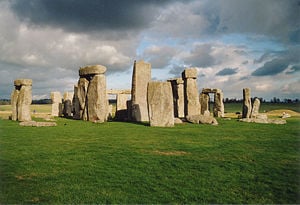
Cro-Magnons (the first anatomically modern humans) are believed to have arrived in Europe about 40,000 years ago, and lived in the region that was to become the United Kingdom by 27,000 years ago. Up to around 6000 B.C.E., the islands were connected to Europe, and were easily accessible by nomadic hunter-gatherers. Around 4000 B.C.E., Neolithic immigrants brought agriculture, used stone tools, buried their dead in communal graves of stone or mounds of earth, and conducted rituals at henge monuments. From around 2300 B.C.E., Beaker folk, who buried their dead in individual graves, often with a drinking vessel, arrived from the Low Countries and middle Rhine. These people knew how to work copper and gold. Wessex chieftains dominated trade, and ensuing prosperity enabled these chieftains to build the large bluestone monoliths known as Stonehenge.
The Celts
From the eighth century B.C.E., Celts arrived, and hill forts began to appear. A succession of migrations took place from 700 B.C.E. to 400 B.C.E. Settlements had a traditional round house, and farming was characterized by small fields, and storage pits for grain. Iron daggers were made, then swords, and with increasing pressure on resources, increasing numbers of hill forts were built.
Romans invade
The first Roman invasion of the British Isles was led by Julius Caesar in 55 B.C.E.; the second, a year later in 54 B.C.E. Although no territory was taken for the Roman Empire on either occasion, this was the start of the Roman settlement of Britain. The Romans had many supporters among the Celtic tribal leaders, who agreed to pay tributes to Rome in return for Roman protection. The Romans returned in 44 C.E., led by Claudius, this time establishing control, and establishing a province Britannia. Initially an oppressive rule, gradually the new leaders gained a firmer hold on their new territory which at one point stretched from the south coast of England to Wales and as far away as Scotland (though they did not hold the latter for long). Hadrian's Wall, built on the Solway-Tyne isthmus (122 C.E.-130 C.E.) marked the frontier of Roman civilization.
Over the approximately 350 years of Roman occupation of Britain, the majority of settlers were soldiers garrisoned on the mainland. It was with constant contact with Rome and the rest of Romanized Europe through trade and industry that the native Britons themselves adopted Roman culture and customs.
Christianity introduced
Christianity is thought to have come from three directions — from Rome (via Roman merchants and soldiers) to the south, and Scotland and Ireland to the north and west. Christianity made little headway until the late fourth century, initially among wealthy villa owners. By the end of Roman rule, in 410 C.E., Christianity had made headway there, but the leaders followed the teachings of the Briton Pelagius, considered heretical, because he emphasized the importance of the human will over divine grace in attaining salvation. This philosophy of self-reliance has been linked to a strong British drive to maintain national independence.
Anglo-Saxon England
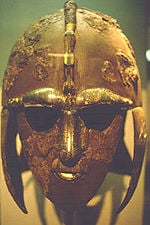
The history of Anglo-Saxon England covers the history of early medieval England from the end of Roman Britain and the establishment of Anglo-Saxon kingdoms in the fifth century until the Conquest by the Normans in 1066. It is speculated that the first Germanic immigrants to Britain arrived at the invitation of the Roman rulers. The traditional division into Angles, Saxons and Jutes is first seen in the Historia ecclesiastica gentis Anglorum by Bede, however historical and archaeological research has shown that a wider range of Germanic peoples from the coast of Frisia, Lower Saxony, Jutland and Southern Sweden moved to Britain in this era. After the withdrawal of the last legions from Britain by Honorius in the early fifth century, the number of newcomers increased, and it is speculated that relations with the ruling Romanized Britons became strained.
By about 449, open conflict had broken out, and the immigrants began to establish their own kingdoms in what would eventually become the Heptarchy, the seven petty kingdoms which eventually merged to become the Kingdom of England during the early tenth century: Northumbria, Mercia, East Anglia, Essex, Kent, Sussex, and Wessex. The Anglo-Saxon kingdoms tended to coalesce by means of warfare. As early as the time of Ethelbert of Kent, one king could be recognised as Bretwalda ("Lord of Britain"). Generally speaking, the title fell in the seventh century to the kings of Northumbria, in the eighth to those of Mercia, and finally, in the ninth, to Egbert of Wessex, who in 825 defeated the Mercians at the Battle of Ellendun. In the next century his family came to rule all England.
Vikings
The earliest date given for a Viking raid of Britain is 789 when, according to the Anglo-Saxon Chronicle, Portland was attacked. A more reliable report dates from June 8, 793, when the monastery at Lindisfarne on the east coast of England was pillaged by foreign seafarers. These raiders, whose expeditions extended well into the ninth century, were gradually followed by settlers who brought a new culture and tradition markedly different from that of the prevalent Anglo-Saxon society. These enclaves rapidly expanded, and soon the Viking warriors were establishing areas of control to such an extent that they could reasonably be described as kingdoms. Viking conquest of large parts of England established the Danelaw, a name given to northern and eastern England in which the laws of the Danes held predominance over those of the Anglo-Saxons.
The Kingdom of England
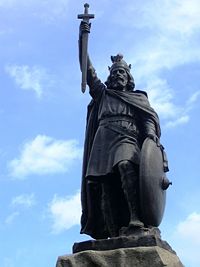
Originally, England (or Angleland) was a geographical term to describe the territory of Britain which was occupied by the Anglo-Saxons, rather than a name of an individual nation-state. During the ninth century, the southern Anglo-Saxon kingdom of Wessex came to dominate other kingdoms in England (especially as a result of the extinction of rival lines in England during the First Viking Age). Alfred the Great (849-899), who was king of Wessex from 871 to 899, defeated the Viking Guthrum at the Battle of Edington in 878.
England was unified in 927 by Athelstan. For several hundred years, the Kingdom of England would fall in and out of power between several Wessex and Danish kings. For over half a century, the unified Kingdom of England became part of a vast Danish empire under Canute the Great, before regaining independence for a short period under the restored West-Saxon lineage of Edward the Confessor.
The Kingdom of England (including Wales) continued to exist as an independent nation-state right through to the Acts of Union and the Union of Crowns. However the political ties and direction of England were changed forever by the Norman Conquest in 1066.
Norman conquest
The Norman conquest of England by William the Conqueror (Duke of Normandy) in 1066, and his success at the Battle of Hastings resulted in the Norman control of England. William ordered the compilation of the Domesday Book, a survey of the entire population and their lands and property for tax purposes. The Norman conquest was a pivotal event in English history for a number of reasons. This conquest linked England more closely with Continental Europe through the introduction of a Norman aristocracy, thereby lessening Scandinavian influence. It created one of the most powerful monarchies in Europe and engendered a sophisticated governmental system. The use of the Anglo-Norman language by the aristocracy endured for centuries and left an indelible mark in the development of modern English. The conquest changed the English culture, and set the stage for rivalry with France, which would continue intermittently until the twentieth century. It has an iconic role in English national identity as the last successful military conquest of England.
The Middle Ages

The English Middle Ages, which lasted from 1066 until conflicts over the English throne between the Houses of Lancaster and York, known as the Wars of the Roses, ended in 1487, were characterized by civil war, international war, occasional insurrection, and widespread political intrigue among the aristocratic and monarchic elite. England was an important part of expanding and dwindling empires based in France, with the "King of England" being a subsidiary title of a succession of French-speaking Dukes of territories in what became France. English kings used England as a source of troops to enlarge their personal holdings in France for the duration of the Hundred Years' War (1337 to 1453). In fact the English crown did not relinquish its last foothold on mainland France until Calais was lost during the reign of Mary Tudor (the Channel Islands remain crown dependencies).
The Principality of Wales, under the control of English monarchs from the Statute of Rhuddlan in 1284, became part of the Kingdom of England by the Laws in Wales Acts 1535–1542. Wales shared a legal identity with England as the joint entity originally called "England" and later "England and Wales".
Magna Carta
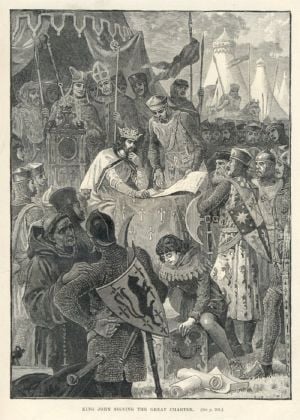
The signing of the Magna Carta in 1215, had lasting impact. King John (1166 – 1216) suffered the loss of Normandy and numerous other French territories following the disastrous Battle of Bouvines in 1214. He managed to antagonize the feudal nobility and leading Church figures to the extent that in 1215, they led an armed rebellion and forced him to sign the Magna Carta, which required the king to renounce certain rights, respect certain legal procedures and accept that "the will of the king could be bound by law." It established that the king may not levy or collect any taxes (except the feudal taxes to which they were hitherto accustomed) without the consent of a council. Magna Carta was the most significant early influence on the long historical process that led to the rule of constitutional law.
The Black Death
An epidemic of catastrophic proportions, the Black Death first reached England in the summer of 1348. The Black Death is estimated to have killed between a third and two-thirds of Europe's population. England alone lost as many as 70 percent of its population, which passed from seven million to two million in 1400. The plague repeatedly returned to haunt England throughout the fourteenth to seventeenth centuries. The Great Plague of London in 1665–1666 was the last plague outbreak.
The English Reformation
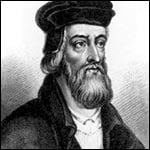
During the English Reformation, the external authority of the Roman Catholic Church in England was abolished and replaced with a Church of England, outside the Roman Catholic Church, under the Supreme Governance of the English monarch. The English Reformation differed from its European counterparts in that it was a political, rather than purely theological, dispute at root.
John Wycliffe (c.1320 – 1384), an English theologian and early proponent of reform in the Roman Catholic Church, worked tirelessly on an English translation of the Bible in one complete edition. Since his beliefs and teachings seemed to compare closely with Luther, Calvin, and other reformers, historians have called Wycliffe "The Morning Star of the Reformation." The itinerant preachers, called Lollards, Wycliffe sent throughout England, created a spiritual revolution. Intense persecution, from both the religious and secular authorities, cracked down on the Lollards sending the movement underground.
John Wycliffe denied the doctrine of transubstantiation, which holds that the bread and wine used in the Eucharist changes in substance into the body and blood of Jesus. He was condemned in a Papal Bull in 1410, and all his books were burned. The seeds of reform that Wycliffe planted were not to blossom until a couple hundred years later.
The Tudors
The relatively unknown Henry Tudor, Henry VII, won the final conflict in the Wars of the Roses, the Battle of Bosworth Field in 1485, where the Yorkist Richard III was killed, thus beginning the Tudor period, which lasted until the death of Queen Elizabeth I in 1603.
King Henry VIII (1491-1547) split with the Roman Catholic Church over a question of his divorce from Catherine of Aragon. Though his religious position was not at all Protestant, the resultant schism ultimately led to England distancing itself almost entirely from Rome. There followed a period of great religious and political upheaval, which led to the English Reformation, the royal expropriation of the monasteries and much of the wealth of the church. The dissolution of the monasteries had the effect of giving many of the lower classes (the gentry) a vested interest in the Reformation continuing, for to halt it would be to revive Monasticism and restore lands which were gifted to them during the Dissolution.
Henry VIII had one legitimate child and two illegitimate children who survived him. Edward VI of England was only a boy of 10 when he took the throne in 1547. When Edward VI lay dying of tuberculosis in 1553, Mary I (1516-1558) took the throne amidst popular demonstration in her favor in London. Mary, a devout Catholic, also known as Bloody Mary, tried to re-impose Catholicism, which led to 274 burnings of Protestants, which are recorded especially in John Foxe's Book of Martyrs. She was highly unpopular among her people, and the Spanish party of her husband, Philip II caused much resentment around Court. Mary died at the age of 42, to be succeeded by her half-sister, who became Elizabeth I.
The reign of Elizabeth restored a sort of order to the realm. The religious issue, which had divided the country since Henry VIII, was put to rest by the Elizabethan Religious Settlement, which created the Church of England in much the same form we see it today. The Act of Supremacy of 1559 re-established the English church’s independence from Rome, with Parliament conferring on Elizabeth the title Supreme Governor of the Church of England, while the Act of Uniformity of 1559 set out the form the English church would take, including establishing the Book of Common Prayer, and phrasing the delicate issue of transubstantiation. Much of Elizabeth's success was in balancing the interests of the Puritans (radical Protestants) and "die-hard" Catholics.
The slave trade that established Britain as a major economic power can be attributed to Elizabeth, who granted John Hawkins the permission to commence trading in 1562. The number of Africans transported to England was so great due to the slave trade that by 1596 Elizabeth complained. She tried unsuccessfully to expel them via a Proclamation in 1601.
The Stuarts
Elizabeth died in 1603 without leaving any direct heirs. Her closest male Protestant relative was the King of Scots, James VI, of the House of Stuart, who, following the Union of the Crowns, became King James I of England. King James I & VI as he was styled became the first king of the entire island of Great Britain, though he continued to rule the Kingdom of England and the Kingdom of Scotland separately. A number of assassination attempts were made on James, notably the Main Plot and Bye Plots of 1603, and most famously, on November 5, 1605, the Gunpowder Plot, by a group of Catholic conspirators, led by Guy Fawkes, which was stoked up and served as further fuel for antipathy in England towards the Catholic faith.
British colonies
Plantations in Ireland, from 1608, formed a pattern for establishing colonies, and several people involved in those projects also had a hand in the early colonization of North America—Humphrey Gilbert, Walter Raleigh, Francis Drake and Ralph Lane. In 1607, England built an establishment in Virginia (Jamestown), in what was to become the United States of America. This was the beginning of English colonization. Many English settled in North America for religious or economic reasons. While the first party religious pilgrims left for the New World in 1620, in the second half of the seventeenth century, those numbers increased dramatically, as these religious pilgrims sought a land where they could worship freely.
The English merchants holding plantations in the warm southern parts of America then resorted rather quickly to the slavery of Native Americans and imported Africans in order to cultivate their plantations and sell raw material (particularly cotton and tobacco) in Europe. The English merchants involved in colonization accrued fortunes equal to those of great aristocratic landowners in England, and their money, which fueled the rise of the middle class, permanently altered the balance of political power.
The empire took shape during the early seventeenth century, with the English settlement of the eastern colonies of North America, which would later become the original United States, as well as Canada's Atlantic provinces, and the colonization of the smaller islands of the Caribbean such as Saint Kitts, Barbados and Jamaica. The sugar-producing colonies of the Caribbean, where slavery became central to the economy, were at first England's most important and lucrative colonies.
Civil war

The English Civil War was a series of armed conflicts and political machinations which took place between Parliamentarians and Royalists from 1642 until 1651. The English Civil War broke out in 1642, largely as a result of an ongoing series of conflicts between James' son, Charles I, and Parliament. The defeat of the Royalist army by the New Model Army of Parliament at the Battle of Naseby in June 1645 effectively destroyed the king's forces. Charles surrendered to the Scottish army at Newark. He was eventually handed over to the English Parliament in early 1647. He escaped and the Second English Civil War began, although it was to be only a short conflict, with Parliament quickly securing the country. The capture and subsequent trial of Charles led to his beheading in January 1649 at Whitehall Gate in London. The Civil War ended with the Parliamentary victory at the Battle of Worcester on September 3, 1651. The English monarchy was replaced with the Commonwealth of England (1649–1653) and then with a Protectorate (1653–1659), under the personal rule of Oliver Cromwell. After a brief return to Commonwealth rule, in 1660 The Crown was restored and Charles II accepted Convention Parliament's invitation to return to England.
During this period from 1649-1660, known as the "interregnum", the monopoly of the Church of England on Christian worship in England came to an end, and the victors consolidated the already-established Protestant Ascendancy in Ireland. Constitutionally, the wars established a precedent that British monarchs could not govern without the consent of Parliament although this would not be cemented until the Glorious Revolution later in the century.
In 1665, London was swept by the plague, and then, in 1666, the capital was swept by the Great Fire, which raged for five days, destroying approximately 15,000 buildings.
Glorious Revolution
The death of Charles II in 1685 meant his Catholic brother was crowned King James II & VII. England with a Catholic King on the throne was too much for both people and parliament and in 1689 the Dutch Protestant Prince William of Orange was invited to replace King James II in what became known as the Glorious Revolution. Despite attempts to secure his reign by force, James was finally defeated by William at the Battle of the Boyne in 1690. On February 13, 1689, Parliament passed the Declaration of Right, in which it deemed that James, by attempting to flee on December 11, 1688, had abdicated the government of the realm, thereby leaving the Throne vacant. William and Mary were crowned together at Westminster Abbey on April 11, 1689.
William III of England encouraged the passage of the Act of Toleration 1689, which guaranteed religious toleration to certain Protestant nonconformists. It did not, however, extend toleration to Roman Catholics or those of non-Christian faiths. Thus the Act was not as wide-ranging as James II's Declaration of Indulgence, which attempted to grant freedom of conscience to people of all faiths.
However, in parts of Scotland and Ireland Catholics loyal to James remained determined to see him restored to the throne and there followed a series of bloody though unsuccessful uprisings. As a result of these, any failure to pledge loyalty to the victorious King William was severely dealt with. The most infamous example of this policy being the Massacre of Glencoe in 1692. Jacobite rebellions continued on into the mid-eighteenth century until the son of the last Catholic claimant to the throne, |James III & VIII, mounted a final campaign in 1745. The Jacobite forces of Prince Charles Edward Stuart, the "Bonnie Prince Charlie" of legend, were resoundly defeated at the Battle of Culloden in 1746.
United Kingdom formed
Under the Acts of Union 1707, England (including Wales) and Scotland, which had been in personal union since the Union of the Crowns in 1603, agreed to a political union in the form of a unified Kingdom of Great Britain. The Act of Union 1800 united the Kingdom of Great Britain with the Kingdom of Ireland, which had been gradually brought under English control between 1541 and 1691, to form the United Kingdom of Great Britain and Ireland in 1801.
Since 1707 England, while ceasing to exist as an independent political entity, has remained highly dominant in what is now the United Kingdom of Great Britain and Northern Ireland. Due to her geographic size and large population, the dominant political and economic influence in the UK stems from England. London has remained the capital city of the UK and has built upon its status as the economic and political centre of the UK. It is also one of the world's great cities.
Enlightenment Britain
Britain was an important part of the Age of Enlightenment with philosophical and scientific input and a literary and theatrical tradition. Over the next century England played an important role in developing Western ideas of parliamentary democracy, partly via the emergence of a multi-party system, as evidenced in the rise of the Whig and Tory political parties. There were significant contributions to literature, the arts and science. But, like other Great Powers, England was involved in colonial exploitation, including the infamous Atlantic slave trade, until the passing of the 1807 Slave Trade Act made the UK the first nation to permanently prohibit trade in slaves.
Confidence in the rule of law, which followed establishment of the prototype of constitutional monarchy in Britain in the Glorious Revolution of 1688, and the emergence of a stable financial market there based on the management of the national debt by the Bank of England, contributed to the capacity for, and interest in, private financial investment in industrial ventures. In addition, Britain had an entrepreneurial class which believed in progress, technology and hard work. This Protestant work ethic has been regarded as one of the cornerstones of national prosperity.
The British Empire
After the defeat of Napoleon Bonaparte (1769-1821) in the Napoleonic Wars (1804-1815), Britain became the principal naval power of the nineteenth century. At its peak, the British Empire was the largest empire in history and for a substantial time was the foremost global power.
The Industrial Revolution
England led the Industrial Revolution, a period in the late eighteenth and early nineteenth centuries when technological advances and mechanization transformed a largely agrarian society throughout Europe, causing considerable social upheaval. Much of the agricultural workforce was uprooted from the countryside and moved into large urban centers of production, as the steam-based production factories could undercut traditional cottage industries. The consequent overcrowding into areas with little supporting infrastructure saw dramatic increases in the rise of infant mortality (to the extent that many Sunday schools for pre-working age children (five or six) had funeral clubs to pay for each other's funeral arrangements), crime, and social deprivation. Many workers saw their livelihoods threatened by the process, and some frequently sabotaged or attempted to sabotage factories. These saboteurs were known as Luddites.
Chartism
During the early nineteenth century, the working classes began to find a voice. Concentrations of industry led to the formation of guilds and unions, which, although at first suppressed, eventually became powerful enough to resist government policy. Chartism is thought to have originated from the passing of the 1832 Reform Bill, which gave the vote to the majority of the (male) middle classes, but not to the "working class." Many people made speeches on the "betrayal" of the working class and the "sacrificing" of their "interests" by the "misconduct" of the government. In 1838, six members of Parliament and six working men formed a committee, which then published the People's Charter.
But by the end of the Victorian era (1900), England lost its industrial leadership, particularly to the United States, which surpassed England in industrial production and trade in the 1890s, as well as to the German Empire.
Victorian England
England's Victorian era marked the height of the British Industrial Revolution and the apex of the British Empire. Although commonly used to refer to the period of Queen Victoria's rule between 1837 and 1901, scholars debate whether the Victorian period—as defined by a variety of sensibilities and political concerns that have come to be associated with the Victorians—actually begins with the passage of the Reform Act 1832. The era was preceded by the Regency era and succeeded by the Edwardian period
By virtue of Queen Victoria's marriage to Prince Albert, son of Duke Ernst I of the small German duchy of Saxe-Coburg and Gotha, her descendants were members of the ducal family of Saxe-Coburg and Gotha with the house name of Wettin. Victoria's son Edward VII and his son George V reigned as members of this house.
World War I
The First World War was a global military conflict which took place primarily in Europe between 1914 and 1918. More than nine million soldiers and civilians died. The conflict had a decisive impact on the history of the twentieth century. The Entente Powers, led by France, Russia, the United Kingdom and later Italy (from 1915) and the United States (from 1917), defeated the Central Powers, led by the Austro-Hungarian, German, and Ottoman Empires. Russia withdrew from the war after the revolution in 1917.
High anti-German feeling among the people during World War I prompted the Royal Family to abandon all titles held under the German crown and to change German-sounding titles and house names for English-sounding versions. On July 17, 1917, a royal proclamation by George V provided that all agnatic descendants of Queen Victoria would be members of the House of Windsor with the personal surname of Windsor. The name Windsor has a long association with English royalty through the town of Windsor and Windsor Castle.
After the carnage of the Great War, Britain remained an eminent power, and its empire expanded to its maximum size, gaining the League of Nations mandate over former German and Ottoman colonies after World War I. By 1921, the British Empire held sway over a population of about 458 million people, approximately one-quarter of the world's population. It covered about 14.2 million square miles, about a quarter of Earth's total land area. As a result, its legacy is widespread, in legal and governmental systems, economic practice, militarily, educational systems, sports (such as cricket, rugby and football), and in the global spread of the English language and Anglican Christianity. At the peak of its power, it was often said that "the sun never sets on the British Empire" because its span across the globe ensured that the sun was always shining on at least one of its numerous colonies or subject nations.
Independence for the Irish Free State in 1922 followed the partition of Ireland two years previously, with six of the nine counties of the province of Ulster remaining within the UK, which then changed in 1927 to the name of the United Kingdom of Great Britain and Northern Ireland.
World War II
The Second World War was a worldwide military conflict which lasted from 1939 to 1945. It was the amalgamation of two conflicts, one beginning in Asia, in 1937, as the Second Sino-Japanese War and the other beginning in Europe, in 1939, with the invasion of Poland. It is regarded as the historical successor to World War I. The majority of the world's nations split into two opposing camps: the Allies and the Axis. England fought with its Commonwealth allies including Canada, Australia, New Zealand, South Africa and India, later to be joined by further allies. Spanning much of the globe, World War II resulted in the deaths of over 60 million people, making it the deadliest conflict in human history. The conflict ended in an Allied victory.
Wartime leader Winston Churchill and his successor Clement Atlee helped plan the post-war world as part of the "Big Three." World War II, however, left England financially and physically damaged. Loans taken out during and after World War II from the United States and from Canada were economically costly, but, along with post-war US Marshall aid, they started England on the road to recovery. As a result, the United States and Soviet Union emerged as the world's two leading superpowers, setting the stage for the Cold War for the next 45 years. Independence movements arose in Asia and Africa, while Europe itself began traveling the road leading to integration. During the five decades following World War II, most of the territories of the Empire became independent. Many went on to join the Commonwealth of Nations, a free association of independent states.
Multi-ethnic welfare state
The immediate post-war years brought the establishment of the British Welfare State and one of the world's first and most comprehensive health services, while the demands of a recovering economy brought people from all over the Commonwealth to create a multi-ethnic England. Although the new postwar limits of Britain's political role were confirmed by the Suez Crisis of 1956, the international currency of the language meant the continuing impact of its literature and culture, while at the same time from the 1960s its popular culture found an influence abroad.
Following a period of economic stagnation and industrial strife in the 1970s after a global economic downturn, the 1980s saw the inflow of substantial North Sea oil revenues, and the premiership of Margaret Thatcher, under whom there was a marked break with the post-war political and economic consensus. Her supporters credit her with economic success, but her critics blame her for greater social division. From the mid-1990s onward these trends largely continued under the leadership of Tony Blair.
The United Kingdom has been a member of the European Union since 1973. The attitude of the present Labour government towards further integration with this organization has been mixed, and the Liberal Democrats supportive.
Government and politics
There has not been a Government of England since 1707, when the Kingdom of England merged with the Kingdom of Scotland to form the Kingdom of Great Britain, although both kingdoms have been ruled by a single monarch since 1603. Prior to the Acts of Union of 1707, England was ruled by a monarch and the Parliament of England.
The Scottish and Welsh governing institutions were created by the UK parliament with support from the majority of people of Scotland and Wales in referenda in 1997 and are not independent of the rest of Britain. However, this gave each country a separate and distinct political identity, leaving England (83 percent of the UK population) as the only part of Britain directly ruled in nearly all matters by the British government in London. In Cornwall, a region of England claiming a distinct national identity, there has been a campaign for a Cornish assembly along Welsh lines by nationalist parties such as Mebyon Kernow.
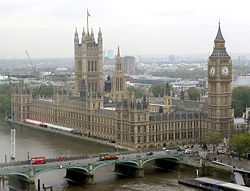
Because Westminster is the UK parliament but also votes on local English matters (England has no parliament of its own) devolution of national matters to parliament/assemblies in Scotland, Wales and Northern Ireland has refocused attention on a long-standing anomaly called the West Lothian question. Before Scottish devolution, purely-Scottish matters were debated at Westminster, but subject to a convention that only Scottish MPs could vote on them. The "Question" was that there was no "reverse" convention: Scottish MPs could and did vote on issues relating only to England and Wales.
Welsh devolution has removed the anomaly for Wales, but highlighted the anomaly for England: Scottish and Welsh MPs can vote on English issues, but purely Scottish and Welsh issues are debated in Scotland and Wales, not at Westminster. This problem is exacerbated by an over-representation of Scottish MPs in the government,sometimes referred to as the Scottish mafia; as of September 2006, seven of the 23 cabinet members were Scottish. In addition, Scotland traditionally benefited from moderate malapportionment in its favour, increasing its representation to a degree disproportionate to its population; only recently has the Boundary Commission turned its attention to this issue and not until the 2007 redrawing of boundaries has Scotland's representation been in line with the rest of the UK.
In terms of national administration, England's affairs are managed by a combination of the UK government, the UK parliament, a number of England-specific quangos, such as English Heritage, and the mostly unelected regional assemblies (a kind of nascent executive for each English Region).
There are calls for a devolved English Parliament, and some English people and parties go further by calling for the dissolution of the Union entirely. However, the approach favoured by the Labour government was (on the basis that England is too large to be governed as a single sub-state entity) to propose the devolution of power to the regions of England. Lord Falconer claimed a devolved English parliament would dwarf the rest of the United Kingdom. Referenda would decide whether people wanted to vote for directly-elected regional assemblies to watch over the work of the non-elected regional development agencies.
Subdivisions
Historically, the highest level of local government in England was the county. These divisions had emerged from a range of units of old, pre-unification England (such as the kingdoms of Sussex and Kent) and further medieval reorganisations (sometimes using duchies such as Lancashire and Cornwall). These historical county lines were usually drawn up before the industrial revolution and the mass urbanisation of England. The counties each had a county town and many county names were drawn from these (for example Nottinghamshire, from Nottingham).
A series of local government reorganisations took place since the latter part of the nineteenth century. The solution to the emergence of large urban areas was the creation of large metropolitan counties centred on cities (an example being Greater Manchester). The creation of unitary authorities, where districts gained the administrative status of a county, began with the 1990s reform of local government. Some confusion persists between the ceremonial counties (which do not necessarily form an administrative unit) and the metropolitan and non-metropolitan counties.
Non-metropolitan counties (or "shire counties") are divided into one or more districts. At the very lowest level, England is divided into parishes, though these are not to be found everywhere (many urban areas for example are unparished). Parishes are prohibited from existing in Greater London.
England was also divided into nine regions, which do not have an elected authority and exist to co-ordinate certain local government functions across a wider area. Greater London is an exception, however, and is the one region which now has a representative authority as well as a directly elected mayor. The 32 London boroughs and the Corporation of London remain the local form of government in the city.
Economics

England's economy is the second largest economy in Europe and the fifth largest economy in the world. It follows the Anglo-Saxon economic model. England's economy is the largest of the four economies of the United Kingdom, with 100 of Europe's 500 largest corporations based in London. As part of the United Kingdom, England is a major centre of world economics. One of the world's most highly industrialised countries, England is a leader in the chemical and pharmaceutical sectors and in key technical industries, particularly aerospace, the arms industry and the manufacturing side of the software industry. London exports mainly manufactured goods and imports materials such as petroleum, tea, wool, raw sugar, timber, butter, metals, and meat, exporting over 30,000 tonnes of beef in 2005, worth around £75,000,000, with France, Italy, Greece, the Netherlands, Belgium and Spain being the biggest importers of beef from England.
The central bank of the United Kingdom, which sets interest rates and implements monetary policy, is the Bank of England in London. London is also home to the London Stock Exchange, the main stock exchange in the UK and the largest in Europe. London, is one of the international leaders in finance and the largest financial centre in Europe.
Traditional heavy and manufacturing industries have declined sharply in England in recent decades, as they have in the United Kingdom as a whole. At the same time, service industries have grown in importance. For example, tourism is the sixth largest industry in the UK, contributing 76 billion pounds to the economy. It employs 1,800,000 full-time equivalent people — 6.1% of the working population (2002 figures). The largest centre for tourism is London, which attracts millions of international tourists every year. As part of the United Kingdom, England's official currency is the pound sterling (also known as the British pound or GBP).
Transport
BAA Limited runs many of England's airports, its flagship being London Heathrow Airport, the largest airport by traffic volume in Europe and one of the world's busiest airports, and London Gatwick Airport, the second largest. The third largest is Manchester Airport. This is run by Manchester Airport Group, which also owns various other airports. Other major airports include London Stansted Airport in Essex, about 30 miles (50km) north of London and Birmingham International Airport.
The growth in private car ownership in the latter half of the twentieth century led to a number of major road-building programmes. Important trunk roads built include the A1 Great North Road from London to Newcastle and Edinburgh, and the A580 "East Lancs." road between Liverpool and Manchester. The Preston Bypass was the first section of motorway and opened in 1958 - it now forms part of the M6 motorway, the country's longest motorway running from Rugby through North West England to the Scottish border.
The National Rail network consists of 10,072 route miles (16,116 route km) in Great Britain, of which the majority is in England. Urban rail networks are also well developed in London and several other cities, including the Manchester Metrolink and the London Underground, the oldest and most extensive underground railway in the world, and consisting in 2007 of 253 miles (407 kilometres) of line and serves 275 stations.
There are around 4400 miles of navigable waterways in England, of which roughly half is owned by British Waterways. It is estimated that 165 million journeys are made by people on Britain's waterways annually. The Thames is the major waterway in England, with imports and exports focused at Tilbury, one of the three major ports in the UK. Ports in the UK handled over 560 million tonnes of domestic and international freight in 2005.The government department overseeing transport is the Department for Transport.
Demographics
With 50,431,700 inhabitants, or 84% of the UK's total[1], England is the most populous nation in the United Kingdom; as well as being the most ethnically diverse. England would have the fourth largest population in the European Union and would be the 25th largest country by population if it were a sovereign state.
The country's population is 'ageing', with a declining percentage of the population under age 16 and a rising one of over 65. Population continues to rise and in every year since 1901, with the exception of 1976, there have been more births than deaths.[2] England is one of the most densely populated countries in Europe, with 383 people per square kilometre (992/sq mi),[3] making it second only to the Netherlands.
The generally accepted view is that the ethnic background of the English populace, before 19th- and 20th-century immigration, was a mixed European one deriving from historical waves of Celtic, Roman, Anglo-Saxon, Norse, and Norman invasions, along with the possible survival of pre-Celtic ancestry.
The economic prosperity of England has also made it a destination for economic migrants from Scotland, Wales, Northern Ireland and the Republic of Ireland. This was particularly true during the Industrial Revolution.
Since the fall of the British Empire, many denizens of former colonies have migrated to Britain including the Indian sub-continent and the British Caribbean. A BBC published report of the 2001 census, by the Institute for Public Policy Research stated that the vast majority of immigrants settled in London and the South East of England. The largest groups of residents born in other countries were from the Republic of Ireland, India, Pakistan, Germany, and the Caribbean. Though Germany was high on the list, this was mainly the result of children being born to British forces personnel stationed in that country.[4]
About half the population increase between 1991 and 2001 was due to foreign-born immigration. In 2004 the number of people who became British citizens rose to a record 140,795 - a rise of 12% on the previous year. This number had risen dramatically since 2000. The overwhelming majority of new citizens come from Africa (32%) and Asia (40%), the largest three groups being people from Pakistan, India and Somalia.[5] One in five babies in the UK are born to immigrant mothers, according to official statistics released in 2007 that also show the highest birth rates in Britain for 26 years. 21.9 per cent of all births in the UK in 2006 were to mothers born outside the United Kingdom compared to just 12.8 per cent in 1995.[6]
In 2005, an estimated 565,000 migrants[7] arrived to live in the UK for at least a year, while 380,000 people emigrated from the UK for a year or more, with Australia, Spain and France most popular destinations.[8][9] Largest group of arrivals were people from the Indian subcontinent who accounted for two-thirds of net immigration, mainly fuelled by family reunion.[10]
The European Union allows free movement between the member states. While France and Germany put in place controls to curb Eastern European migration, the UK (along with Ireland) did not impose restrictions. Following Poland's entry into the EU in May 2004 it is estimated that by the start of 2007 about 375,000 Poles have registered to work in the UK, although the total Polish population in the UK is believed to be 750,000. Many Poles work in seasonal occupations and a large number is likely to move back and forth including between Ireland and other EU Western nations. A quarter of Eastern European migrants, often young and well-educated, plan to stay in Britain permanently. Most of them had originally intended to go home but have changed their minds after living there.[11]
Ethnicity
The ancestry of the English, considered as an ethnic group, is mixed; it can be traced to the mostly Celtic Romano-Britons,[12] to the eponymous Anglo-Saxons,[13] the Danish-Vikings[14] that formed the Danelaw during the time of Alfred the Great and the Normans,[15][16] among others. The 19th and 20th centuries, furthermore, brought much new immigration to England.
Ethnicity aside, the simplest view is that an English person is someone who was born in England and holds British nationality, regardless of his or her racial origin. It has, however, been a notoriously complicated, emotive and controversial identity to delimit. Centuries of English dominance within the United Kingdom has created a situation where to be English is, as a linguist would put it, an "unmarked" state. The English frequently include themselves and their neighbours in the wider term of "British", while the Scots and Welsh tend to be more forward about referring to themselves by one of those more specific terms.[17] This reflects a more subtle form of English-specific patriotism in England; St George's Day, the country's national day, is barely celebrated. Though this is mainly down to the fact it is not a public holiday.[citation needed] The celebrations have increased year on year over the past 5 years.[18]
Modern celebration of English identity is often found around its sports, one field in which the British Home Nations often compete individually. The English Association football team, rugby union team and cricket team often cause increases in the popularity of celebrating Englishness.
Religion
Due to immigration in the past decades, there is an enormous diversity of religious belief in England, as well as a growing percentage that have no religious affiliation. Levels of attendance in various denominations have begun to decline. England today is largely a secular country. Although the following percentages : Christianity: 71.6%, Islam: 3.1%, Hindu: 1.1%, Sikh: 0.7%, Jewish: 0.5%, and Buddhist: 0.3%, No Faith: 22.3%.[19], the EU Eurobarometer poll of 2005 shows that only 38%[20] of people in the UK believe in a god and that religious belief is on the decline.
Christianity reached England through missionaries from Scotland and from Continental Europe; the era of St. Augustine (the first Archbishop of Canterbury) and the Celtic Christian missionaries in the north (notably St. Aidan and St. Cuthbert). The Synod of Whitby in 685 ultimately led to the English Church being fully part of Roman Catholicism. Early English Christian documents surviving from this time include the seventh century illuminated Lindisfarne Gospels and the historical accounts written by the Venerable Bede. England has many early cathedrals, most notably York Minster (1080), Durham Cathedral (1093) and Salisbury Cathedral (1220), In 1536, the Church was split from Rome over the issue of the divorce of King Henry VIII from Catherine of Aragon. The split led to the emergence of a separate ecclesiastical authority, and later the influence of the Reformation, resulting in the Church of England and Anglicanism. Unlike the other three constituent countries of the UK, the Church of England is an established church (although the Church of Scotland is a 'national church' recognised in law).
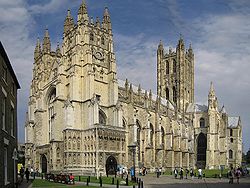
The sixteenth century break with Rome under the reign of King Henry VIII and the dissolution of the monasteries had major consequences for the Church (as well as for politics). The Church of England remains the largest Christian church in England; it is part of the Anglican communion. Many of the Church of England's cathedrals and parish churches are historic buildings of significant architectural importance.
Other major Christian Protestant denominations in England include the Methodist Church, the Baptist Church and the United Reformed Church. Smaller denominations, but not insignificant, include the Religious Society of Friends (the "Quakers") and the Salvation Army — both founded in England. There are also Afro-Caribbean Churches, especially in the London area.
The Roman Catholic Church re-established a hierarchy in England in the nineteenth century. Attendances were considerably boosted by immigration, especially from Ireland and more recently Poland.
Throughout the second half of the twentieth century, immigration from many colonial countries, often from South Asia and the Middle East have resulted in a considerable growth in Islam, Sikhism and Hinduism in England. Cities and towns with large Muslim communities include Birmingham, Blackburn, Bolton, Bradford, Leicester, London, Luton, Manchester, Oldham & Sheffield. Cities and towns with large Sikh communities include London, Slough, Staines, Hounslow, Southall, Reading, Ilford, Barking, Dagenham, Leicester, Leeds, Birmingham, Wolverhampton and others.
The Jewish community in England is mainly located in the Greater London area, particularly the north west suburbs such as Golders Green;[21] although Manchester and Gateshead also have significant Jewish communities.[22][23]
Language

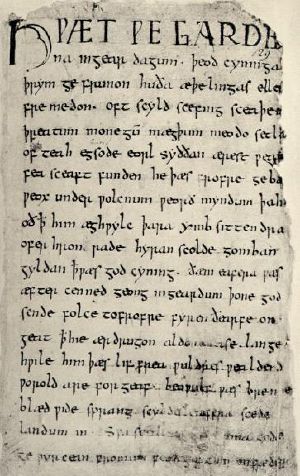
As its name suggests, the English language, today spoken by hundreds of millions of people around the world, originated as the language of England, where it remains the principal tongue today (although not officially designated as such). An Indo-European language in the Anglo-Frisian branch of the Germanic family, it is closely related to Scots and Frisian. As the Anglo-Saxon kingdoms merged into England, "Old English" emerged; some of its literature and poetry has survived.
Used by aristocracy and commoners alike before the Norman Conquest (1066), English was displaced in cultured contexts under the new regime by the Norman French language of the new Anglo-Norman aristocracy. Its use was confined primarily to the lower social classes while official business was conducted in a mixture of Latin and French. Over the following centuries, however, English gradually came back into fashion among all classes and for all official business except certain traditional ceremonies, some of which survive to this day. But Middle English, as it had by now become, showed many signs of French influence, both in vocabulary and spelling. During the Renaissance, many words were coined from Latin and Greek origins; and more recent years, Modern English has extended this custom, being always remarkable for its far-flung willingness to incorporate foreign-influenced words.
It is most commonly accepted that — thanks in large part to the British Empire, and now the United States — the English language is now the world's unofficial lingua franca,[24] while English common law is also the foundation of many legal systems throughout the English-speaking countries of the world.[25] English language learning and teaching is an important economic sector, including language schools, tourism spending, and publishing houses.
UK legislation does not recognise any language as being official,[26] but English is the only language used in England for general official business. The other national languages of the UK (Welsh, Irish, Scots and Scottish Gaelic) are confined to their respective nations, except Welsh to some degree.
The only non-Anglic native spoken language in England is the Cornish language, a Celtic language spoken in Cornwall, which became extinct in the nineteenth century but has been revived and is spoken in various degrees of fluency, currently by around 2000 people.[27] This has no official status (unlike Welsh) and is not required for official use, but is nonetheless supported by national and local government under the European Charter for Regional or Minority Languages. Cornwall County Council has produced a draft strategy to develop these plans. There is, however, no programme as yet for public bodies to actively promote the language. Scots is spoken by some adjacent to the Anglo-Scottish Border, and Welsh is still spoken by some natives around Oswestry, Shropshire, on the Welsh border.
Most deaf people within England speak British sign language (BSL), a sign language native to Britain. The British Deaf Association estimates that 250,000 people throughout the UK speak BSL as their first or preferred language,[28] but does not give statistics specific to England. Neither Cornish nor BSL are official languages of the UK and most British government departments and hospitals have limited facilities for deaf people. The BBC broadcasts several of its programmes with BSL interpreters.
Different languages from around the world, especially from the former British Empire and the Commonwealth of Nations, have been brought to England by immigrants. Many of these are widely spoken within ethnic minority communities, with Hindi, Bengali, Tamil, Punjabi, Urdu, Polish, Greek, Turkish and Cantonese being the most common languages that people living in Britain consider their first language. These are often used by official bodies to communicate with the relevant sections of the community, particularly in big cities, but this occurs on an "as needed" basis rather than as the result of specific legislative ordinances.
Other languages have also traditionally been spoken by minority populations in England, including Romany.
Despite the relatively small size of the nation, there are a many distinct English regional accents. Those with particularly strong accents may not be easily understood elsewhere in the country. Use of foreign non-standard varieties of English (such as Caribbean English) is also increasingly widespread, mainly because of the effects of immigration.
Men and women
Education
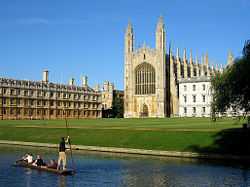
There is a long history of the promotion of education in England in schools, colleges and universities. England is home to the oldest existing schools in the English speaking world: The King's School, Canterbury and The King's School, Rochester, believed to be founded in the sixth and seventh century respectively. There are at least eight existing schools in England which were founded in the first millennium. Most of these ancient institutions are fee-paying schools, however there are also very early examples of state schools in England, most notably Beverley Grammar School founded in 700. State and private schools and colleges have continued side by side since that time. Other famous English schools include Eton College (founded 1440), Harrow School (1572)Winchester College (1382), Tonbridge School (1553) and Charterhouse School (1611). The oldest surviving girls' school in England is Red Maids' School founded in 1634. England is also home to the two oldest universities in the English speaking world: Oxford University (twelfth century) and Cambridge University (early thirteenth century). There are more than ninety universities in England and many of these (most notably the universities of Oxford, Cambridge and London) consist of autonomous colleges many of which are world famous in their own right, for example University College, Oxford (founded 1249), Peterhouse, Cambridge (1284) and the London School of Economics (1895).
The education system in England is run by the Department for Children, Schools and Families . The education is split into two main types; State schools which are funded through taxation and free to all, and private schools, which provide a paid-for education on top of taxes (also known as "Public" or "Independent" schools).
Education is the responsibility of Department for Children, Schools and Families at national level and, in the case of publicly funded compulsory education, of Local Education Authorities. The education structures for Wales and Northern Ireland are broadly similar to the English system, but there are significant differences of emphasis in the depth and breadth of teaching objectives in Scotland. Traditionally the English system emphasises depth of education, whereas the Scottish system emphasises breadth.
Class
Culture
England has a vast and influential culture that encompasses elements both old and new. The modern culture of England is sometimes difficult to identify and separate clearly from the culture of the wider United Kingdom, so intertwined are its composite nations. However, the traditional and historic culture of England is more clearly defined.
English Heritage is a governmental body with a broad remit of managing the historic sites, artefacts and environments of England. London's British Museum, British Library and National Gallery contain some of the finest collections in the world.
The English have played a significant role in the development of the arts and sciences. Many of the most important figures in the history of modern western scientific and philosophical thought were either born in, or at one time or other resided in, England. Major English thinkers of international significance include scientists such as Sir Isaac Newton, Francis Bacon, Charles Darwin and New Zealand-born Ernest Rutherford, philosophers such as John Locke, John Stuart Mill, Bertrand Russell and Thomas Hobbes, and economists such as David Ricardo, and John Maynard Keynes. Karl Marx wrote most of his important works, including Das Kapital, whilst in exile in London, and the team that developed the first atomic bomb began their work in the England, under the wartime codename tube alloys.
Architecture

England has played a significant part in the advancement of Western architecture. It is home to some of the finest mediaeval castles and forts in the world (see Castles in England), including Warwick Castle, the Tower of London and Windsor Castle (the largest inhabited castle in the world and the oldest in continuous occupation). It is also known for its numerous grand country houses (see List of historic houses in England), and for its many mediaeval and later churches and cathedrals.
English architects have contributed to a number of styles over the centuries, including Tudor architecture, English Baroque, the Georgian style and Victorian movements such as Gothic Revival.
Among the best-known contemporary English architects are Norman Foster and Richard Rogers.
Art
England is home to the National Gallery, Tate Britain, Tate Liverpool, Tate St. Ives, and the Tate Modern. Significant figures in English art include William Blake, William Hogarth, J.M.W. Turner and John Constable in the eighteenth and early nineteenth centuries, through to the influential William Morris in the late nineteenth, to L. S. Lowry, Henry Moore and Francis Bacon during the twentieth century, and names such as David Hockney and Damien Hirst in the present day.
Cuisine
Although highly-regarded in the Middle Ages, English cuisine later became a source of fun among Britain's French and European neighbours, being viewed until the late twentieth century as crude and unsophisticated by comparison with continental tastes. However, with the influx of non-European immigrants (particularly those of south and east Asian origins) from the 1950s onwards, the English diet was transformed. Indian and Chinese cuisine in particular were absorbed into English culinary life, with restaurants and takeaways appearing in almost every town in England, and 'going for an Indian' becoming a regular part of English social life. A distinct hybrid food style composed of dishes of Asian origin, but adapted to British tastes, emerged and was subsequently exported to other parts of the world. Many of the well-known Indian dishes in the western world, such as Tikka Masala and Balti, are in fact Anglo-Indian dishes of this sort. Chicken Tikka Masala is often jokingly referred to as England's national dish, in a reference both to its English origins and to its enormous popularity.
Dishes forming part of the old tradition of English food include:
|
|
|
|
Engineering and innovation
As birthplace of the Industrial Revolution, England was home to many significant inventors during the late eighteenth and early nineteenth century. Famous English engineers include Isambard Kingdom Brunel, best known for the creation of the Great Western Railway, a series of famous steamships, and numerous important bridges.
Other notable English figures in the fields of engineering and innovation include:
- Richard Arkwright — inventor of the first industrial spinning machine.
- Charles Babbage — inventor of the first computer (in the nineteenth century).
- Tim Berners-Lee — inventor of the World Wide Web, http, html, and many of the other technologies on which the Web is based.
- James Blundell — who performed the first blood transfusion.
- Hubert Cecil Booth — inventor of the Vacuum cleaner.
- Edwin Beard Budding — inventor of the lawnmower.
- George Cayley — inventor of the seat belt.
- Christopher Cockerell — inventor of the hovercraft.
- John Dalton — pioneer of atomic theory.
- James Dyson — inventor of the Dual Cyclone bagless vacuum cleaner.
- Thomas Fowler — inventor of the thermosiphon.
- Robert Hooke — Hooke's law of elasticity
- E. Purnell Hooley — inventor of tarmac.
- Isaac Newton — defining Universal gravitation, Universal gravitation, Newtonian mechanics, Infinitesimal calculus
- Stephen Perry — inventor of the rubber band.
- Percy Shaw — inventor of the "cat's eye" road safety device.
- George Stephenson and Robert Stephenson — railway pioneers (father and son).
- Joseph Swan — developer of the light bulb.
- Richard Trevithick — builder of the earliest steam locomotive.
- Alan Turing and Tommy Flowers — inventors of the modern computer and its associated concepts and technologies.
- Frank Whittle — inventor of the jet engine.
- Joseph Whitworth — inventor of many of the modern techniques and technologies of precision engineering.
Folklore
English folklore is rich and diverse. Many of the land's oldest legends share themes and sources with the Celtic folklore of Wales, Scotland and Ireland, a typical example being the legend of Herne the Hunter, which shares many similarities with the traditional Welsh legend of Gwyn ap Nudd.
Successive waves of pre-Norman invaders and settlers, from the Romans onwards, via Saxons, Jutes, Angles, Norse to the Norman Conquest have all influenced the myth and legend of England. Some tales, such as that of The Lambton Wyrm show a distinct Norse influence, whilst others, particularly some of the events and characters associated with the Arthurian legends show a distinct Romano-gaulic slant.[29]
The most famous body of English folk-tales concerns the legends of King Arthur, although it would be wrong to regard these stories as purely English in origin as they also concern Wales and, to a lesser extent, Ireland and Scotland. They should therefore be considered as part of the folklore of the British Isles as a whole.
Post-Norman stories include the tales of Robin Hood, which exists in many forms, and stories of other folk heroes such as Hereward The Wake and Dunn of Cumbria who, although being based on historical characters, have grown to become legends in their own right.
Finally, other historical figures come to have legends associated with them (such as Sir Francis Drake and 'Drake's Drum'). These figures then move out of the realm of historical fact and into the realm of mythology.
Literature
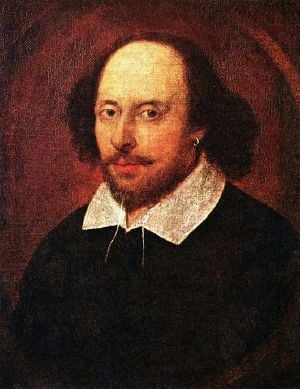
The English language boasts a rich and prominent literary heritage. England has produced a wealth of significant literary figures including playwrights William Shakespeare, Christopher Marlowe, Ben Jonson, John Webster, as well as writers Daniel Defoe, Henry Fielding, Jane Austen, William Makepeace Thackeray, Charlotte Bronte, Emily Bronte, J.R.R. Tolkien, Charles Dickens, Mary Shelly, HG Wells, George Eliot, Rudyard Kipling, DH Lawrence, EM Forster, Virginia Woolf, George Orwell and Harold Pinter. Others, such as Agatha Christie, Enid Blyton and J.K. Rowling have been among the best-selling novelists of the last century. Among the poets, Geoffrey Chaucer, Edmund Spenser, Sir Philip Sydney, Thomas Kyd, John Donne, Andrew Marvell, Alexander Pope, William Wordsworth, Lord Byron, John Keats, John Milton, Samuel Taylor Coleridge, T.S. Eliot (an English Citizen from 1927) and many others remain read and studied around the world. Among men of letters, Samuel Johnson, William Hazlitt and George Orwell are some of the most famous. England continues to produce writers working in all branches of literature, and in a wide range of styles; contemporary English literary writers attracting international attention include Martin Amis, Julian Barnes and Zadie Smith.
Music

Composers from England have not achieved recognition as broad as that earned by their literary counterparts, and particularly during the nineteenth century, were overshadowed in international reputation by other European composers; however, many works of earlier composers such as Thomas Tallis, William Byrd, and Henry Purcell are still frequently performed throughout the world today. A revival of England's musical status began during the twentieth century with the prominence of composers such as Edward Elgar, Gustav Holst, William Walton, Eric Coates, Ralph Vaughan Williams, Frederick Delius and Benjamin Britten.
In popular music, however, English bands and solo artists have been cited as the most influential and best-selling musicians of all time. Acts such as The Beatles, The Who, The Rolling Stones, Pink Floyd, The Smiths, Led Zeppelin, The Clash, Black Sabbath, The Cure, Iron Maiden, David Bowie, Queen, Spice Girls, Oasis, The Police, Robbie Williams, Sir Elton John and Radiohead,are amongst the biggest selling in the world. England is also credited with being the birthplace of many pop-culture movements such as hard rock, British invasion, heavy metal, britpop, glam rock, drum and bass, grindcore, progressive rock, indie, punk, goth, shoegazing, acid house and UK garage.
Science and philosophy
Prominent English figures from the field of science and mathematics include Sir Isaac Newton, Michael Faraday, J. J. Thomson, Charles Babbage, Charles Darwin, Stephen Hawking, Christopher Wren, Alan Turing, Francis Crick, Joseph Lister, Tim Berners-Lee, Andrew Wiles and Richard Dawkins. Some experts claim that the earliest concept of a Metric system was invented by John Wilkins, first secretary of the Royal Society in 1668.[33]
England played an important role in the development of Western philosophy, particularly during the Enlightenment. Jeremy Bentham, leader of the Philosophical Radicals, and his school are recognised as the men who unknowingly laid down the doctrines for Socialism.[34] Bentham's impact on English law is also considerable. Aside from Bentham, major English philosophers include Francis Bacon, Thomas Hobbes, John Locke, Thomas Paine, John Stuart Mill, Bernard Williams and Bertrand Russell.
Sport
A number of modern sports were codified in England during the nineteenth century, among them cricket, rugby union and rugby league, football, tennis and badminton. Of these, association football, rugby and cricket remain the country's most popular spectator sports. England contains more UEFA 5 star and 4 star rated stadia than any other country, and is home to some of the sport's top clubs. The England national football team are considered one of the game's superpowers (currently ranked 12th by FIFA and 7th by Elo), having won the World Cup in 1966 when it was hosted in England. Since then, however, they have failed to reach a final of a major international tournament, though they reached the semi-finals of the World Cup in 1990 and the quarter-finals in 2002 and 2006 and Euro 2004.
The England national rugby union team and England cricket team are often among the best performing in the world, with the rugby union team winning the 2003 Rugby World Cup, and the cricket team winning The Ashes in 2005, and being ranked the second best Test nation in the world. Rugby union clubs such as Leicester Tigers, London Wasps and the Northampton Saints have had success in the Europe-wide Heineken Cup. At rugby league, the England national rugby league team are to compete more regularly after 2006, when England will become a full test nation in lieu of the Great Britain national rugby league team, when that team is retired after the 2006 Rugby League Tri-Nations. The English Rugby Team will now be looking forward to prosper in The Rugby World Cup 2007 which will be held in France in the next few weeks.
Sport England is the governing body responsible for distributing funds and providing strategic guidance for sporting activity in England.
The 2012 Summer Olympics are to be hosted by London, England. It will run from 26 July to 12 August 2012. London will become the first city to have hosted the modern Olympic Games three times, having previously done so in 1908 and 1948.
Nomenclature
The country is named after the Angles, one of several Germanic tribes who settled the country in the fifth and sixth centuries. There are two distinct linguistic patterns for the name of the country.
|
The majority of European languages use names similar to "England":
|
The Celtic names are quite different, referring to the Saxons, another family of Germanic tribes which arrived at about the same time as the Angles.
The names in Asian languages:
Names In other languages:
|
Alternative names include:
- the slang "Blighty", from the Hindustani "bila yati" meaning "foreign" (which coincidentally resembles "Britain")
- "Albion", an ancient name, supposedly referring to the white (Latin alba) cliffs of Dover. Originally it referred to the whole island of Great Britain, and is still sometimes seen that way today, but is more often used for England. Following the Roman conquest of Britain, the term contracted to mean only the area north of Roman control and is today a relative of Alba, the Celtic languages name for Scotland.
- More poetically, England has been called "this sceptred isle...this other Eden" and "this green and pleasant land", quotations respectively from the poetry of William Shakespeare (in Richard II) and William Blake (And did those feet in ancient time).
Slang terms sometimes used for the people of England include "Sassenachs" or "Sasanachs" (from the Scots Gaelic and Irish Gaelic respectively, both originally meaning "Saxon"), "Limeys" (in reference to the citrus fruits carried aboard English sailing vessels to prevent scurvy) and "Pom/Pommy" (used in Australian English and New Zealand English), but these may be perceived as offensive. Also see alternative words for British.
National symbols, insignia and anthems
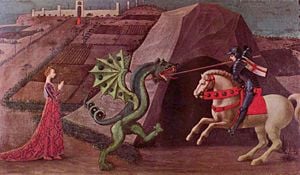
The two main traditional symbols of England are the St George's cross (the English flag), and the Three Lions coat of arms.
Other national symbols exist, but have varying degrees of official usage, such as the oak tree and the rose.
England's National Day is St George's Day (Saint George being the patron saint), which is on 23 April.[35]
St George's Cross
The St George's Cross is a red cross on a white background. It is the national flag of England. In the past it was rarely seen flying, but in recent times has experienced an increase in popularity.[citation needed] It is believed to have been adopted for the uniform of English soldiers during the Crusades of the eleventh, twelfth and thirteenth centuries.[citation needed] From about 1277 it became the national flag of England. St George's Cross was originally the flag of Genoa and was adopted by England and the City of London in 1190 for their ships entering the Mediterranean to benefit from the protection of the powerful Genoese fleet. The maritime Republic of Genoa was rising and going to become, together with its rival Venice, one of the most important powers in the world. The English Monarch paid an annual tribute to the Doge of Genoa for this privilege. The cross of St George would become the official Flag of England.
A red cross acted as a symbol for many Crusaders in the twelfth and thirteenth centuries. It became associated with St George and England, along with other countries and cities (such as Georgia, Milan and the Republic of Genoa), which claimed him as their patron saint and used his cross as a banner. It remained in national use until 1707, when the Union Flag (also known as the Union Jack, especially at sea) which English and Scottish ships had used at sea since 1606, was adopted for all purposes to unite the whole of Great Britain under a common flag. The flag of England no longer has much of an official role, but it is widely flown by Church of England properties and at sporting events. The Flag of St George has gained popularity in recent years, and is widely seen flown out of houses, or on cars during important sporting tournaments in which England is competing. (Paradoxically, the latter is a fairly recent development; until the late twentieth century, it was commonplace for fans of English teams to wave the Union Flag, rather than the St George's Cross).
Three Lions
The arms of England are gules, three lions passant guardant or; the earliest surviving record of their use was by Richard I (Richard the Lionheart) in the late twelfth century.
Since union with Scotland and Northern Ireland, the arms of England are no longer used on their own; instead they form a part of the conjoined Royal coat of arms of the United Kingdom. However, both the Football Association and the England and Wales Cricket Board use logos based on the three lions. In recent years, it has been common to see banners of the arms flown at English football matches, in the same way the Lion Rampant is flown in Scotland.
In 1996, Three Lions was the official song of the England football team for the 1996 European Football Championship, which were held in England.
Rose
The Tudor rose is the national floral emblem of England, and was adopted as a national emblem of England around the time of the Wars of the Roses.[36]
The rose is used in a variety of contexts in its use for England's representation. The so-called Rose of England is a Royal Badge, and is a Tudor, or half-red-half-white rose, [37] symbolising the end of both the Wars of the Roses and the subsequent marriage between the House of Lancaster and the House of York. This symbolism is reflected in the Royal coat of arms of the United Kingdom and the crest of the FA. However, the rose of England is often displayed as a red rose (which also symbolises Lancashire), such as the badge of the England national rugby union team. A white rose (which also symbolises Yorkshire) is also used on different occasions.
Anthem
England does not have an official designated national anthem, as the United Kingdom as a whole has "God Save the Queen". However, the following are often considered to be unofficial English national anthems:
- "I Vow to Thee, My Country"
- "Land of Hope and Glory"
- "Nimrod"
- "Jerusalem"
- "Heart of Oak"
"God Save the Queen" is usually played for English sporting events, such as football matches, against teams from outside the UK,[38] although "Land of Hope and Glory" was used as the English anthem for the 2002 Commonwealth Games.[39] Since 2004, "Jerusalem" has been sung before England cricket matches,[40] and "Rule Britannia" (Britannia being the Roman name for Great Britain a personification of the United Kingdom) was often used in the past for the English national football team when they played against another of the home nations but more recently "God Save the Queen" has been used by both the rugby union and football teams.[38]
Gallery of images
- Middlesbrough Transporter Bridge.jpg
Middlesbrough Transporter Bridge
Stonehenge — a Neolithic and Bronze Age megalithic monument in Wiltshire.
See also
| |||||||||||||||||
ReferencesISBN links support NWE through referral fees
- ↑ Population Estimates National Statistics Online, August 24, 2006. URL accessed September 12, 2006
- ↑ Population Estimates National Statistics Online, August 24, 2006. URL accessed September 12, 2006.
- ↑ http://www.statistics.gov.uk/cci/nugget.asp?id=760. URL accessed 19 November 2006
- ↑ BBC - "British Immigration Map Revealed" Accessed 16 May, 2007
- ↑ BBC Thousands in UK citizenship queue
- ↑ 1 in 5 babies in Britain born to immigrants
- ↑ National Statistics Online - Immigration over half a million
- ↑ Indians largest group among new immigrants to UK
- ↑ 1500 immigrants arrive in Britain daily, report says
- ↑ 1,500 migrants enter UK a day
- ↑ 750,000 and rising: how Polish workers have built a home in Britain.
- ↑ Roman Britons after 410 by Martin Henig: British Archaeology Retrieved 22 October 2006.
- ↑ Anglo-Saxon Origins: The Reality of the Myth by Malcolm Todd. Retrieved 22 October 2006.
- ↑ Legacy of the Vikings By Elaine Treharne, BBC History. Retrieved 22 October 2006.
- ↑ What Did the Normans Do for Us? By Dr John Hudson, BBC History. Retrieved 22 October 2006.
- ↑ The Adventure of the English, Melvyn Bragg, 2003. Pg 21
- ↑ "What makes you British?", BBC News online, 2007-03-30.
- ↑ St George's events 'not enough'. BBC News, April 23, 2005. URL accessed September 12, 2006.
- ↑ 2001 Census
- ↑
 PDF. Page 11. European Commission. Retrieved on 7 December 2006
PDF. Page 11. European Commission. Retrieved on 7 December 2006
- ↑ Jewish Virtual Library - England by Shira Schonenburg. URL retrieved 6 June 2007.
- ↑ Manchester Jewish Synagogues, Judaism, Hebrew Congregations and Jewish Organisations in Greater Manchester. URL retrieved 6 June 2007.
- ↑ Rabbi Bezalel Rakow - Guardian Unlimited. URL retrieved 6 June 2007.
- ↑ English: Not America's Language? by Mauro E. Mujica - The Globalist > > Global Culture. URL retrieved 6 June 2007.
- ↑ Common law - Tiscali reference. URL retrieved 6 June 2007.
- ↑ Yaelf. URL accessed November 15, 2006.
- ↑ Whole Earth magazine. URL accessed November 13, 2006.
- ↑ British Sign Language (BSL). Sign Community Online, 2006. URL accessed September 12, 2006.
- ↑ B.Branston The Lost Gods of England.
- ↑ Encyclopedia Britannica article on Shakespeare. Accessed Feb. 26, 2006.
- ↑ MSN Encarta Encyclopedia article on Shakespeare. Accessed Feb. 26, 2006.
- ↑ Columbia Electronic Encyclopedia article on Shakespeare. Accessed Feb. 26, 2006.
- ↑ Metric system was British - BBC video news
- ↑ History of Western Philosophy, Bertrand Russell
- ↑ "The Great Saint George Rivival", BBC News, 23 April 1998. Retrieved 2006-12-08.
- ↑ National Flowers of the UK, 10 Downing Street. URL accessed September 14, 2006.
- ↑ England's Rose — The Official History, Sport Network. Museum of Rugby, June 3, 2005. URL accessed September 18, 2006.
- ↑ 38.0 38.1 England: National Anthems - K12 Academics. Retrieved 2007-06-18.
- ↑ New Statesman - Sport - Jason Cowley loves the Commonwealth Games. Retrieved 2007-06-18.
- ↑ Anthem 4 England - Jerusalem - English Anthems - News. Retrieved 2007-06-18.
External links
- Travel guide to England from Wikitravel
- Office for National Statistics
- Enjoy England — The official website of the English Tourist Board
- Enjoy England's Travel Blog — Discover England's best hidden gems
- Official website of the United Kingdom Government
- England-related pages from the BBC
- English Nature — wildlife and the natural world of England.
- English Heritage — national body protecting and promoting English history and heritage.
- Historical and genealogical information from Genuki England
Credits
New World Encyclopedia writers and editors rewrote and completed the Wikipedia article in accordance with New World Encyclopedia standards. This article abides by terms of the Creative Commons CC-by-sa 3.0 License (CC-by-sa), which may be used and disseminated with proper attribution. Credit is due under the terms of this license that can reference both the New World Encyclopedia contributors and the selfless volunteer contributors of the Wikimedia Foundation. To cite this article click here for a list of acceptable citing formats.The history of earlier contributions by wikipedians is accessible to researchers here:
- England history
- Geography_of_the_United_Kingdom history
- London history
- Administrative_divisions_of_England history
The history of this article since it was imported to New World Encyclopedia:
Note: Some restrictions may apply to use of individual images which are separately licensed.


